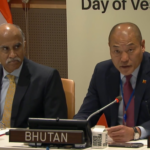‘In world on fire, Buddha’s teachings hold key to answers’

United Nations: In today’s world that is “on fire” from wars, economic rivalries, poverty, and environmental degradation, diplomats and scholars looked back more than 2,500 years to the teachings of Buddha for solutions.
At a discussion organised on Thursday by India at the UN on ‘Teachings of Gautama Buddha — a Path to Internal and Global Peace’, they had a consensus that the path to international peace starts with inner peace.
Santosh Kumar Raut, Visiting Professor at Harvard Divinity School, said “Let us recognise that the world is in a crisis, as Buddha says, ‘The world is on fire’”.
The world is beset by environmental disasters, climate change, Nuclear proliferation, wars, the deterioration of democratic institutions and the fabric of civil society in many places with polarisation and the erosion of shared values, and widening economic inequalities “that fuels extremism and undermine the collective security”, he said.
“When we act with compassion and respect, many of our national and international problems will fall into a perspective and become easier to solve”, he said.
“The Buddha understood meaningfully that change would come only by changing inner consciousness”, he added.
India’s Permanent Representative P Harish said, “The path of Buddha offers us practical means to develop lasting peace within ourselves as also the external world”.
The “transformative power of Buddhism is not limited to individuals, but it can change societies, it can change, nations and indeed the whole world”, he said.
Starting with inner peace and intrapersonal peace, there is an ascendant path through stages that finally leads to “a practice of inter-group (peace), of what we call today as international peace, the peace between groups, between nations at an international level or a regional level”, he said.
“This is the last level representing cultivation of peace and compassion among societies and nations”, he said.
Harish also pointed out that sometimes, when faced with violence, the greater good of the people may require going beyond the letter of ‘ahimsa’ to protect them.
Buddha’s teaching places guardrails in determining these situations, he said.
“Rulers and decision makers must deter aggression and a calculated pursuit of violence in today’s world” by nations “impelled by political goals such as territorial expansion or domination, or by deviant nonstate actors and terrorists who sow fear and destruction due to their deviant belief systems”, he said.
“The ethical quality of our action is to be determined, not only by its conformity to formal rules, but also by the intention or motivation that lies behind it”, he said.
“When the motivation of our rulers is to protect lives, to prevent harm, the ruler or decision-maker must place the greater good above adherence to the letter of the principle of non-violence”, he said.
Bhutan’s Permanent Representative Pema Lektup Dorji said, “India holds a revered place in the spiritual heritage of humankind.” The sacred sites like Bodh Gaya where Prince Siddhartha attained enlightenment and became the Buddha, “are held in the deepest reverence by Buddhists around the world”, he said.
Thailand Cherdchai Chaivaivid said that amid the discussions on reforming the UN, it must be realised that “the world cannot be reformed without the reform of mind”.
Russia’s Deputy Permanent Representative Dmitry Chumakov said, “There are schools of diplomacy which like to talk about reforms (through) external changes, but it is really important to talk about changing internally”. “Buddhism has real peacemaking philosophy”, he said.
Abhay Kumar Singh, the vice chancellor of Nalanda University, said, “Peace is not born out of conquest, but from renunciation of the very notions of victory and defeat”.
–IANS
The post ‘In world on fire, Buddha’s teachings hold key to answers’ appeared first on News Room Odisha.
News